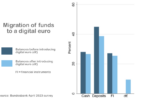In preparation for the digital euro, today the European Union commenced a targeted consultation of the payments sector and organizations representing consumers, retailers and compliance authorities. This industry-focused central bank digital currency (CBDC) consultation complements the one conducted by the European Central Bank (ECB) last year, which was targeted at the general public.
It also forms part of an impact assessment as a step towards passing further regulations. Respondents can reply until June 14.
No decision has been made to proceed with a digital euro, but a two-year research phase started in July 2021.
The Treaty on the European Union (TEU) has a section that relates to the euro as a single currency. And for a potential digital euro to be used in addition to coins and notes, regulatory amendments would be needed.
A number of areas are covered in the consultation questionnaire, including the:
- impact and feature priorities for both private and commercial users
- role of the digital euro in promoting a digital economy, including as legal tender
- impact on banks, the broader financial sector, financial stability
- application of anti-money laundering rules
- privacy and data protection
- international usage.
Privacy emphasis
Many central banks recognize that privacy is a key issue and hope to offer greater privacy than private electronic payments. However, few are willing to provide the same degree of anonymity that physical cash enables.
Last year, the ECB’s public consultation found privacy is a deal-breaker. In contrast, the ECB published results from recent focus group research last week, with many interviewees saying they don’t consider privacy when making payments.
Today’s consultation questionnaire includes several AML and privacy-related questions with the most detail around how risky low-value offline transactions are considered for AML purposes.
One of the most interesting questions is under what circumstances the central bank should be able to access private data. The options provided were payment settlement purposes, security risks assessment, AML, fraud, or something else.







